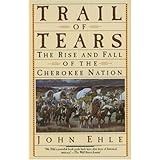
Average Reviews:

(More customer reviews)John Ehle, a native son of North Carolina, has dedicated most of his life toward using his pen to bring to life the rich history of his birthstate. With Trail of Tears, he has succeeded again where so many others, in this day and age of political correctness and historical revisionism, have failed. Ehle's work is factually rich, it is obvious Mr. Ehle spent many hours in archives thoroughly researching the book's subject matter. The book's narrative structure is compelling, focusing on the role of several prominent families within the Cherokee Nation to animate the hierarchical structure of Cherokee society and the stratification of power therein.
Some readers will be shocked to discover how pervasive European culture was within significant elements of the Cherokee nation in North Carolina. The curiosity of most readers will be piqued again and again with the factually accurate exposure to the structure of the Cherokee's -- Christian churches, post office, town hall -- how they made a concerted effort to adapt to the European white world in an effort to integrate, and therefore survive, amidst a sea of change occurring during the 19th century.
Mr. Ehle's work has been criticized for its depiction of wealthy, landed Cherokee's as slave owners. This evidence flies in the face of the more contemporary interpretation of the brotherhood of the oppressed alleged to exist between persecuted American Indians and the African slave population. This notion is patently false. At the time, the Cherokees were neither persecuted nor advocates of slave rights. They were, as Mr. Ehle points out, consistently adapting the institutions of the white European settlers, good or bad, and slavery was one of those institutions the Cherokees adopted.
Perhaps the greatest tragedy here is that Mr. Ehle did not tell the story of other regional Indian nations, such as the Muskhogean tribes of the Chicksaw and Choctaw peoples, both of which suffered exponentially more at the hands of the American government and white European settlers than did the Cherokee. Unfortunately, as with most events in history, much of what we don't want to see is swept under the carpet of painful ingorance.
Despite this shortcoming, and one cannot fault Mr. Ehle for not expanding the scope of his work, I strongly recommend this book and understand why it continues to be found on the syllabi of all serious academic courses on American Indian history.
Click Here to see more reviews about: Trail of Tears: The Rise and Fall of the Cherokee Nation
The fascinating portrayal of the Cherokee nation, filled with Native American legend, lore, and religion -- a gripping American drama of power, politics, betrayal, and ambition.B & W photographs
Click here for more information about Trail of Tears: The Rise and Fall of the Cherokee Nation

0 comments:
Post a Comment